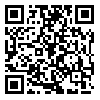BibTeX | RIS | EndNote | Medlars | ProCite | Reference Manager | RefWorks
Send citation to:
URL: http://jhosp.tums.ac.ir/article-1-5548-en.html
2- M.Sc Student in Health Services Management, Department of Health Services Management, school of Health Management and Medical Informatics, Tabriz University of Medical Science, Tabriz, Iran, (*corresponding author): Email:alidoostsd@yahoo.com ,
3- Quality improvement Supervisor, Tabriz University of Medical Science, Tabriz, Iran
Background: Medication administration is an important part of care process. Correct medication administration and its accordance with standards are essential concerning the significant effects on patients’ health. Hence, this study was designed and carried out to determine Medication administration process using “clinical audit”.
Materials and Methods: This study was a cross-sectional one which carried out with “clinical audit” in a hospital of Tabriz city in 2014. This audit conducted in six steps as followed: 1) selecting topic of clinical audit, 2) determining the criteria and standards, 3) assessment of current status, 4) comparing current situation with standards( Standards of Ministry of Health, Medication safety handbook, medication administration curriculum and NHS guideline in medication management), 5) designing and implementing intervention and 6) re-audit. In order to organize process evaluation, a valid instrument used via observation and checklist.
Results: Results of this audit study revealed that 11 out of 25 assessed steps had very low accordance with standards (less than 15%) and the average accordance of total process was 47 percent before intervention. However, the average of standard adherence rate increased to 78 percent after intervention implementation.
Conclusions: The results indicated the effectiveness of educational intervention programs in using kardex instead of medication card on improving medication administration process generally. In spite of the occurred improvement, it is necessary to have an ongoing assessment and intervention in order to quality improvement.
Received: 2015/08/27 | Accepted: 2015/12/31 | Published: 2016/03/3
| Rights and permissions | |
 |
This work is licensed under a Creative Commons Attribution-NonCommercial 4.0 International License. |





